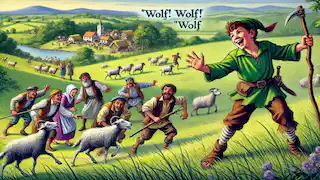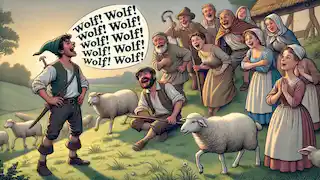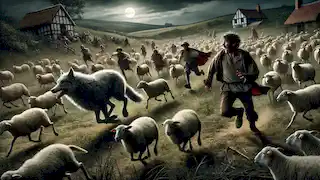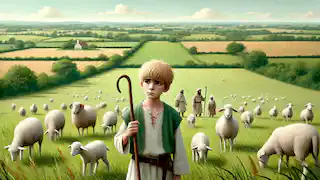Once upon a time, in a small village nestled at the foot of the mountains, there lived a young boy named Peter. Peter was an energetic and curious boy, always eager to explore and make up stories to entertain himself and the villagers. His father, a hardworking shepherd, had entrusted him with the important responsibility of watching over their flock of sheep. Every day, Peter would lead the sheep to the green pastures just beyond the village and keep watch to make sure no harm came to them.
At first, Peter took his duties seriously. He would sit atop a small hill that overlooked the pasture, his eyes constantly scanning the horizon for any sign of danger. The sheep grazed peacefully, unaware of the young boy’s watchful eyes. But as the days passed, Peter began to grow bored. Watching sheep all day long, he thought, was not nearly as exciting as he had imagined. There was no excitement, no adventure, and certainly no danger.
The more Peter sat in the quiet of the field, the more his mind wandered. He started thinking about how exciting it would be if something dramatic happened—something that would get the attention of the whole village. And that’s when the idea struck him. What if he pretended that there was danger? What if he called for help, claiming that a wolf was attacking the sheep? Surely that would bring some excitement to his otherwise dull day.
And so, Peter stood up on the hill, cupped his hands around his mouth, and shouted, "Wolf! Wolf! There's a wolf attacking the sheep!"

The villagers, hearing Peter’s frantic cries, dropped everything they were doing and ran toward the pasture. Farmers, bakers, blacksmiths, and even the village elders all came rushing, armed with whatever they could find—sticks, pitchforks, and even pots and pans. They were determined to save Peter and his sheep from the fierce predator.
But when they arrived at the pasture, there was no wolf. The sheep were grazing peacefully, and Peter was sitting on the hill, laughing. "I fooled you all!" Peter shouted gleefully. "There was no wolf. I just wanted to see if you would come."
The villagers were not amused. Some of them scolded Peter for causing such a panic, while others simply shook their heads and returned to the village, muttering about how foolish the boy had been. Peter, however, was pleased with himself. He had broken the monotony of the day, and he had managed to get the attention of the entire village.
But that wasn’t the end of it. A few days later, Peter found himself once again growing bored as he watched the sheep graze in the meadow. The excitement of the last prank had faded, and now the quiet and stillness of the pasture seemed even more unbearable. He began to think about how funny it had been to see the villagers come running, how their faces had been filled with concern, only to turn to frustration when they realized there was no wolf. "I’ll do it again," Peter thought. "This time, it’ll be even funnier." And so, once again, Peter climbed to the top of the hill and shouted at the top of his lungs, "Wolf! Wolf! There's a wolf attacking the sheep!" The villagers, though still wary from the last time, were good-hearted people. They could not ignore a call for help, especially when it came to protecting the village’s flock of sheep. So, they dropped their tools and ran to the pasture once more. This time, they were less hurried but still determined to protect the sheep from the threat of the wolf. But, just like the first time, there was no wolf. The sheep were grazing peacefully, and Peter was rolling on the grass, laughing at the sight of the villagers rushing to his aid. "I fooled you again!" Peter cried. "You should have seen the look on your faces!" The villagers were even more frustrated than before. Some shouted at Peter, telling him that his pranks were not funny and that he should take his duties as a shepherd seriously. Others simply turned and walked back to the village without a word, knowing that the boy would have to learn his lesson eventually. But Peter wasn’t concerned with their anger. He had once again brought excitement to his day, and that was all that mattered to him. For a while, Peter refrained from calling "wolf" again. The villagers had grown weary of his antics, and he could sense that they were less likely to believe him if he cried out for help again. But as the days passed, the boredom of watching the sheep once again settled over Peter like a heavy blanket. He wanted to feel the thrill of seeing the villagers rush to his aid, to hear the sound of their hurried footsteps and see the concern in their eyes. "I’ll do it just one more time," Peter thought to himself. "Just one more time, and then I’ll stop." And so, for the third time, Peter climbed to the top of the hill and shouted with all his might, "Wolf! Wolf! There's a wolf attacking the sheep!" This time, however, the villagers did not come running. They had grown tired of Peter’s lies and had decided that they would not be fooled again. They carried on with their work, assuming that Peter was once again playing a prank on them. But Peter continued to shout, louder and more desperately. "Wolf! Wolf! Please, help! The wolf is attacking the sheep!" Still, the villagers did not come. They had learned their lesson. But this time, something was different. This time, there really was a wolf. A large, fierce wolf had crept down from the mountains and into the pasture, its eyes fixed on the flock of sheep. The wolf, hungry and determined, had been watching the sheep for days, waiting for the right moment to strike. And now, with no villagers in sight and Peter’s cries for help falling on deaf ears, the wolf attacked. Peter watched in horror as the wolf darted toward the sheep, its sharp teeth gleaming in the sunlight. He shouted and waved his arms, trying to scare the wolf away, but it was no use. The wolf was too powerful, and Peter was too small and alone to defend the flock. Desperate, Peter ran to the village, shouting at the top of his lungs, "Wolf! Wolf! Please, help! The wolf is attacking the sheep!" But when he arrived in the village, out of breath and panicked, the villagers simply shook their heads. "We won’t be fooled again," one of the elders said. "We’ve learned our lesson. There’s no wolf." "But it’s true this time!" Peter cried, his voice trembling with fear. "There really is a wolf, and it’s attacking the sheep!" The villagers, however, did not believe him. They had been fooled too many times before, and they were not willing to be fooled again. Peter, realizing that no help was coming, turned and ran back to the pasture, hoping to save what remained of the flock. When Peter returned to the pasture, he found the scene even worse than he had feared. The wolf had scattered the flock, and several sheep had been killed. The few that remained huddled together, trembling in fear. Peter fell to his knees, overwhelmed with guilt and sorrow. He had caused this. His lies had led to the destruction of the very flock he had been entrusted to protect. He sat in the field for a long time, his heart heavy with regret. The villagers had trusted him to watch over the sheep, and he had betrayed that trust by playing pranks and crying wolf when there was no danger. Now, when he needed their help the most, they had not come, and it was all his fault. As the sun began to set behind the mountains, casting a long shadow over the valley, Peter gathered the remaining sheep and led them back to the village. His father was waiting for him at the edge of the pasture, his face etched with worry. When he saw the look on Peter’s face and the state of the flock, he knew what had happened. "You cried wolf again, didn’t you?" his father asked quietly. Peter nodded, unable to meet his father’s eyes. "I’m sorry," he whispered. "I didn’t think… I didn’t think it would actually happen." His father sighed, placing a hand on Peter’s shoulder. "The villagers trusted you, Peter. They believed you when you cried for help. But you broke that trust by lying. Now, when you needed them, they didn’t believe you." "I know," Peter said, his voice thick with tears. "I’ll never cry wolf again. I promise." The next day, Peter went to each of the villagers to apologize for his behavior. He admitted that his pranks had been foolish and irresponsible, and he promised to never lie again. The villagers, though still wary, accepted his apology, knowing that Peter had learned a valuable lesson. From that day forward, Peter took his duties as a shepherd seriously. He watched over the flock with care, always keeping a vigilant eye for any sign of danger. And though the boredom of watching the sheep sometimes crept back into his mind, he never again cried wolf when there was no wolf. He had learned that trust, once broken, is not easily repaired, and that the consequences of lying can be far greater than he had ever imagined. Years later, the story of Peter and the wolf became a well-known tale in the village, passed down from one generation to the next as a lesson in honesty and responsibility. Parents would tell their children about the boy who cried wolf, warning them that lies, even when they seem harmless, can have serious consequences. Peter, now a grown man, had become a respected member of the village . He was known not only for his hard work as a shepherd but also for the wisdom he had gained from his mistakes. He never forgot the lesson he had learned that day in the pasture, and he made sure to teach it to others, hoping that they would learn from his experience and never make the same mistake. As the years went by, the village flourished, and the flock of sheep grew larger and healthier than ever before. Peter continued to watch over them, always mindful of the trust that had been placed in him. He knew that trust was a precious thing, something that could be easily broken but was difficult to earn back. And so, he lived his life with honesty and integrity, knowing that the truth was always more valuable than any lie. The story of "The Boy Who Cried Wolf" remains a timeless lesson in the importance of honesty and the consequences of deception. It reminds us that while it may be tempting to seek attention or excitement through lies, those lies can come back to harm us in ways we never expected. Trust is a fragile thing, and once it’s broken, it can be difficult, if not impossible, to repair. Peter’s story serves as a reminder that we must always be truthful, even when the truth may seem dull or unimportant. For in the end, it is the truth that will protect us, and lies that will lead us into danger.*

*
*
*

*
*

*



















